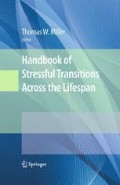Abstract
I was discussing a movie, “The Eternal Sunshine of the Spotless Mind” with a group of clinical psychology students – psychotherapists-in-training. As we were musing about the relationship between suffering and growth, one fresh-faced student remarked that he thought that just as much growth issued from positive experiences as from negative ones and that, perhaps, negative ones weren’t necessary at all for personal growth. From the perspective of 70 years, 40 of which have been spent doing psychotherapy, I was speechless, gasping inwardly at such breathtaking naivete. Then I recalled being a fresh-faced psychotherapist-in-training myself and a graduate school friend, older than I by at least 10 years, told me that he was reluctant to talk with me about his marital problems because, as he said, “You just don’t have the experience necessary to understand.” He was right, but I was hurt by his response. That I still remember it is important. It was a negative experience; I felt badly; and I learned from it.
Although generally optimistic, I confess to a “tragic view of life.” I believe that all growth involves change, that change means loss (of a previous position, of a certain view of oneself and the world), and that loss is painful. Undergoing disequilibration and subsequent accommodation (change) is not a pleasant experience; that is why so many avoid it, preferring assimilation (remaining the same) instead. But meaningful change and growth inevitably entail some suffering. So, although this article is not intended to celebrate pain, it does recognize the necessity of some suffering as one transits life stages and stretches oneself to adapt to stressful situations.
Access this chapter
Tax calculation will be finalised at checkout
Purchases are for personal use only
References
Berzonsky, M. D. (1989). Identity style: Conceptualization and measurement. Journal of Adolescent Research, 4(3), 267–281.
Bilsker, D., & Marcia, J. E. (1990). Adaptive regression and ego identity. Journal of Adolescence, 14, 75–84.
Bradley, C. L. (1997). Generativity-stagnation: Development of a status model. Developmental Review, 17(3), 262–290.
Bradley, C. L., & Marcia, J. E. (1998). Generativity-stagnation: A five-category model. Journal of Personality, 66(1), 39–64.
Erikson, E. H. (1958). Young man Luther: A study in psychoanalysis and history. New York: Norton.
Erikson, E.H. (1969). Gandhi’s truth. New York: Norton
Erikson, E. H. (1980). Identity and the life cycle: A reissue. New York: Norton.
Erikson, E. H. (1996). The Galilean sayings and the sense of “I”. Psychoanalysis and Contemporary Thought, 19(2), 291–337.
Flum, H. (1990). What is the evolutive style of identity formation? Paper presented at the meeting of the Society for Research in Adolescence, Atlanta, GA
Freud, S. (1930). Civilization and its discontents. In J. Strachey (Ed.), The Standard Edition of the Complete Psychological Works of Sigmund Freud (XXI). London: Hogarth.
Hartmann, H. (1964). Essays in ego psychology. New York: International Universities Press.
Hearn, S., Saulnier, G., Strayer, J., Glenham, M., & Koopman, R. (in preparation). Between integrity and despair: Toward construct validation of Erikson’s eighth stage. Department of Psychology, Simon Fraser University, Burnaby, British Columbia, Canada
Ibsen, H. (1966). Peer gynt: A dramatic poem (Translation by Peter Watts). London: Penguin.
Jung, C. G. (1959). Conscious, unconscious, and individuation. In Collected Works, (vol. 7). New York: Pantheon
Kegan, R. (1982). The evolving self: Problem and process in human development. Cambridge, MA: Harvard University Press.
Kelly, G. (1955). The psychology of personal constructs. New York: Norton.
Kroger, J. (2007). Identity development: Adolescence and Adulthood (2nd Ed.). Thousand Oaks, CA: Sage.
Marcia, J. E. (1993). The relational roots of identity. In J. Kroger (Ed.), Discussions on ego identity (pp. 101–120). Hillsdale, NJ: L.E. Erlbaum.
Marcia, J. E. (1998). Optimal development from an Eriksonian perspective. In Encyclopedia of mental health (vol. 3, pp. 29–39). New York: Academic
Marcia, J. E. (1998b). Peer Gynt’s life cycle. In A. L. van der Lippe (Ed.), Development in adolescence (pp. 193–211). New York: Routledge.
Marcia, J. E. (2002). Identity and psychosocial development in adulthood. Identity: An International Journal of Theory and Research, 2(1), 7–28.
Marcia, J. E. (2004). Why Erikson? In K. Hoover (Ed.), The future of identity: Centennial reflections on the legacy of Erik Erikson (pp. 43–59). New York: Lexington.
Marcia, J. E., Waterman, A. S., Matteson, D. R., Archer, S. L., & Orlofsky, J. L. (1993). Ego identity: A handbook for psychosocial research. New York: Springer.
Orlofsky, J. L., Marcia, J. E., & Lesser, I. M. (1973). Ego identity status and the Intimacy versus Isolation crisis of young adulthood. Journal of Personality and Social Psychology, 27(2), 211–219.
Piaget, J. (1954). The construction of reality in the child. New York: Basic.
Stephen, J., Fraser, E., & Marcia, J. E. (1992). Lifespan identity development: Variables related to Moratorium-Achievement (MAMA) cycles. Journal of Adolescence, 15(3), 283–300.
Waterman, A. S. (2007). Identity: An International Journal of Theory and Research, 7(4), 263–348
Whitbourne, S. K., Zuschlag, M. K., Elliot, L. B., & Waterman, A. S. (1992). Psychosocial development in adulthood: A 22-year sequential study. Journal of Personality and Social Psychology, 63(2), 260–271.
Author information
Authors and Affiliations
Corresponding author
Editor information
Editors and Affiliations
Rights and permissions
Copyright information
© 2010 Springer Science+Business Media, LLC
About this chapter
Cite this chapter
Marcia, J.E. (2010). Life Transitions and Stress in the Context of Psychosocial Development. In: Miller, T. (eds) Handbook of Stressful Transitions Across the Lifespan. Springer, New York, NY. https://doi.org/10.1007/978-1-4419-0748-6_2
Download citation
DOI: https://doi.org/10.1007/978-1-4419-0748-6_2
Published:
Publisher Name: Springer, New York, NY
Print ISBN: 978-1-4419-0747-9
Online ISBN: 978-1-4419-0748-6
eBook Packages: Behavioral ScienceBehavioral Science and Psychology (R0)

